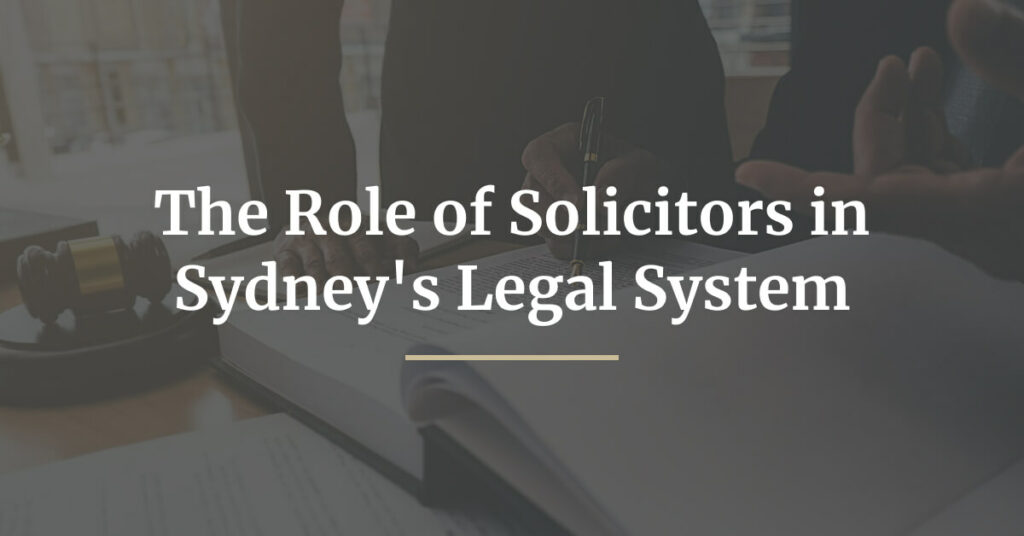
The Role of Solicitors in Sydney’s Legal System
Sydney, the largest city in Australia, houses a dynamic and intricate legal framework. Integral to this system are solicitors, the hard-working legal professionals who often serve as the primary point of contact for individuals seeking legal assistance. Their multifaceted roles, ranging from advisors to court advocates, make them indispensable to the effective functioning of Sydney’s legal system.
What is a Solicitor?
In the context of Sydney and wider Australia, a solicitor is a qualified legal professional who provides legal advice on a myriad of legal matters, prepares documents, and represents clients in Sydney courts and tribunals. Unlike barristers who primarily focus on court representation in more complex trials, solicitors have a broader role, often engaging directly with clients to offer tailored advice and solutions.
Key Responsibilities of Solicitors in Sydney
Solicitors in Sydney undertake a variety of roles, reflecting the diversity and breadth of the city’s legal needs. Their responsibilities span from the office to the courtroom and from paperwork to personal consultations.
Client consultations and legal advice
The first step in any legal journey often begins with a consultation. Solicitors in Sydney provide this crucial service, meeting with clients to understand their legal problems, offering expert advice, and outlining potential courses of action. Their insights not only shape legal strategies but also offer clients clarity in often complex situations.
Document preparation: Contracts, wills, and other legal paperwork
Paperwork is the backbone of the legal profession. Solicitors draft, revise, and finalise a vast array of documents. Whether it’s creating a legally binding contract for a business deal, drafting a will to ensure a client’s wishes are upheld after their passing, or any other form of legal documentation, solicitors ensure that every ‘i’ is dotted and ‘t’ crossed.
Representing clients in lower courts and tribunals
While barristers are often the face of higher court trials, solicitors play a pivotal role in representing clients in lower courts and tribunals. These can include local courts, administrative tribunals, or any other legal body where a client might need representation but not necessarily the specialised services of a barrister.
Liaising with barristers for trial representation in higher courts
When a legal matter escalates to higher courts, solicitors often engage barristers for their specialised advocacy skills. In these situations, the solicitor’s role transitions from being a representative to a coordinator, liaising between the client and the barrister. They ensure that the barrister has all the necessary information and documentation, facilitating a seamless legal strategy.
When to Involve a Solicitor in Your Matter
In the complex world of legal matters, timing can be everything. Knowing when to seek the expertise of a solicitor can significantly influence the outcome of your situation.
- Initial Consultation: As soon as you feel you might have a legal issue, it’s wise to consult a solicitor. They can provide early advice, clarify your rights and obligations, and guide your next steps.
- Drafting or Reviewing Documents: If you’re entering into any agreement or need any form of legal documentation, a solicitor can ensure that the paperwork is in your best interest and is legally sound.
- Dispute or Negotiation: Before matters escalate into a larger conflict or legal dispute, involving a solicitor can help mediate and provide solutions that may prevent more significant legal issues down the line.
- Legal Representation: If your matter proceeds to court or a tribunal, a solicitor can represent you, ensuring that your case is presented effectively and your rights are protected.
Importance of Solicitors Within the Sydney Legal System
Sydney’s bustling metropolis isn’t just the heart of business and culture; it’s also a central hub for legal matters in Australia. Solicitors play a pivotal role within this system:
- Gatekeepers of Justice: Solicitors are often the first port of call for anyone needing legal help. They demystify the legal process for clients, ensuring access to justice for all.
- Versatility: Solicitors’ wide range of expertise, from property law to criminal defence, ensures that Sydney’s diverse legal needs are catered to effectively.
- Upholding Professional Standards: Solicitors in Sydney adhere to rigorous professional and ethical standards, ensuring the integrity of the legal system and trust from the public.
- Facilitators of Legal Evolution: As laws change and society evolves, solicitors play a role in shaping and adapting the legal landscape to reflect contemporary needs.
Distinction Between Solicitors, Barristers, And Paralegals
Navigating the legal landscape of Sydney might seem confusing, given the variety of legal professionals available. To simplify, here’s a comprehensive distinction among solicitors, barristers, and paralegals:
Solicitors
- Scope of Work: Solicitors tend to have a broad practice range, often providing advice on matters such as property transactions, family disputes, wills and estates, or commercial matters.
- Client Interaction: They have direct interactions with clients, understanding their needs, offering counsel, and taking action as required.
- Court Representation: While they have the rights of audience in lower courts and tribunals, they might liaise with barristers for more specialised representation in higher courts.
- Training: In Sydney, after obtaining a law degree, aspiring solicitors must complete the Graduate Diploma in Legal Practice and be admitted to the legal practice by the Supreme Court of New South Wales.
Barristers
- Scope of Work: Barristers are specialised legal practitioners who offer expert advice on specific legal matters and represent clients in courts, particularly in complex litigations.
- Client Interaction: Unlike solicitors, barristers typically don’t have direct interactions with clients but receive briefs from solicitors.
- Chambers: Many barristers operate from ‘chambers’, which are essentially shared workspaces, but they function as independent entities.
- Training: After obtaining their law degree and completing their legal training, they must be ‘called to the Bar’ and then complete the Bar Practice Course.
Paralegals
- Scope of Work: Paralegals support legal professionals in their work but don’t offer direct legal advice to clients. Their role can vary significantly depending on the legal setting they work in.
- Tasks: Their tasks can range from legal research, drafting preliminary documents, record maintenance, client communication, to scheduling court appearances or meetings.
- Qualifications: While some paralegals have formal qualifications in legal studies, others may have on-the-job training. Their depth of knowledge can be substantial, but they operate under the guidance of solicitors or barristers.
- Restrictions: They do not represent clients in court or provide legal advice independently.
The Path to Becoming a Solicitor in Sydney
Sydney’s legal community is respected globally for its high standards of professionalism and expertise. For those considering joining this esteemed group as a solicitor, the journey is rigorous but rewarding. Below, we explore the steps to becoming a solicitor in Sydney.
Educational requirements and institutions
- Undergraduate Study: Most aspiring solicitors begin with a Bachelor of Laws (LLB) degree, which provides a comprehensive introduction to Australian law. Leading institutions in Sydney, such as the University of Sydney and UNSW, offer such programs.
- Juris Doctor: For those who have an undergraduate degree in another field, the Juris Doctor (JD) is a postgraduate law degree that serves as an alternative pathway to legal practice.
- Electives and Specialisations: Law schools usually offer electives allowing students to delve deeper into specialised areas of law, from commercial to environmental law, tailoring their education to areas of interest or future practice.
Practical training and admission to the bar
- Graduate Diploma in Legal Practice (GDLP): After completing their law degree, graduates need to undertake the GDLP. This program focuses on the practical skills and knowledge required for legal practice. Institutions like The College of Law in Sydney offer this diploma.
- Practical Experience: Part of the GDLP includes practical legal training, which is typically achieved through placements in legal firms, community legal centres, or government departments.
- Admission: Once the GDLP and practical experience requirements are met, graduates can apply for admission to the role of solicitors. The final step involves a formal admission ceremony at the Supreme Court of New South Wales.
Continuing professional development
- Ongoing Learning: Once admitted as a solicitor, the learning doesn’t stop. Solicitors are required to undertake Continuing Professional Development to ensure they remain updated with the latest legal practices, rulings, and methodologies.
- Mandatory Units: Each year, solicitors in Sydney must complete mandatory units in ethics and professional responsibility, practice management and business skills, and professional skills.
- Seminars and Workshops: Various institutions and legal bodies in Sydney offer seminars, workshops, and courses for solicitors to meet their CPD requirements, ensuring they’re at the forefront of legal practice.
About The Author

Oliver Morrisey LL.M lives and breathes succession law.
Oliver is the Founder and Director of Empower Wills and Estate Lawyers, a law practice specialising in will and estate disputes. Oliver prides himself on the business providing the following customer-centric promises:
1. developing a professional client relationship built on trust.
2. achieving the best outcome for the client.
3. delivering quality services to the client efficiently and effectively.
Located in Edgecliff in Sydney's Eastern Suburbs, Oliver travels regularly to visit clients who choose him for his extensive knowledge and experience.
Oliver invites partnerships or referral enquiries.
